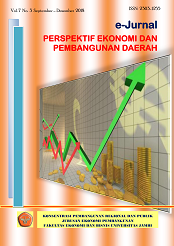Pengaruh jumlah kendaraan bermotor, jumlah penduduk dan kebijakan pemerintah terhadap pertumbuhan ekonomi melalui penerimaan pajak kendaraan bermotor (PKB) di Provinsi Jambi
DOI:
https://doi.org/10.22437/pdpd.v9i3.12486Abstract
This study aims to: (1) To find out and analyze the influence of the number of motorized vehicles, population, and government policy on the acceptance of PKB in Jambi Province in the period 2000-2018, and (2) To find out and analyze the influence of the number of motorized vehicles, population, government policies and PKB's acceptance of economic growth in Jambi Province in the period 2000-2018. This study uses the Path Analysis method. Based on the results of the study that the independent variable that affects motor vehicle tax revenue is the population. The results of the path analysis for structural equation I, namely the contribution of the population in Jambi Province directly have a positive impact on motor vehicle tax revenues in Jambi Province. Furthermore, the independent variables that influence economic growth are the number of vehicles and the population. The results of the path analysis for structural equation II namely the contribution of the number of motorized vehicles in Jambi Province directly have a positive impact and the indirect effect through the population contributes negatively to economic growth in Jambi Province. Furthermore, the contribution of the population in Jambi Province directly has a positive impact and the indirect effect through the number of motor vehicles contributes negatively to economic growth in Jambi Province.
Keywords: Motorized vehicles, Population, Government policy, Motorized vehicle tax revenue, Economic growth.
Downloads
References
David, Garson.(2003). Aplikasi Amos. PT Gramedia Utama: Jakarta.
Gujarati, Damodar.(2006). Dasar-dasar ekonometrika. Erlangga: Jakarta
J Junaidi, Y Yulmardi, H Hardiani. (2020).Jambi City community transportation modes and influencing factors, Jurnal Perspektif Pembiayaan dan Pembangunan Daerah, 8 (5), 455-464
Kaho, Josef Riwu. (2007). Prospek otonomi daerah. PT Raja Grafindo Persada: Jakarta
Noor, Juliansyah. (2014). Metodologi penelitian. Kencana Prenada Media Group: Jakarta
RIA Aditya, Z Zulfanetti, H Heriberta. (2021).Evaluasi penerimaan pajak kendaraan bermotor (PKB) dan bea balik nama kendaraan bermotor (BBN-KB) serta dampaknya terhadap pendapatan asli daerah di Provinsi Jambi, Jurnal Paradigma Ekonomika, 16 (1), 151-166
Robert, D. Retherford. (1993). Statistical models for casual analisysis. USA. https://onlinelibrary.wiley.com/doi/10.1002/9781118033135.ch3/summary
Streiner, David L. (2005). Finding our way: an introduction to path analysis. Can J Psychiatry, 50(2).
Webley, Paul dan Stephan Lea. (1997). Path analysis. exter, Department of Psychology, University of Exeter: UK.
Downloads
Published
How to Cite
Issue
Section
License
Copyright (c) 2020 Hadi Tiawan, Erfit Erfit, Zulgani Zulgani

This work is licensed under a Creative Commons Attribution 4.0 International License.


